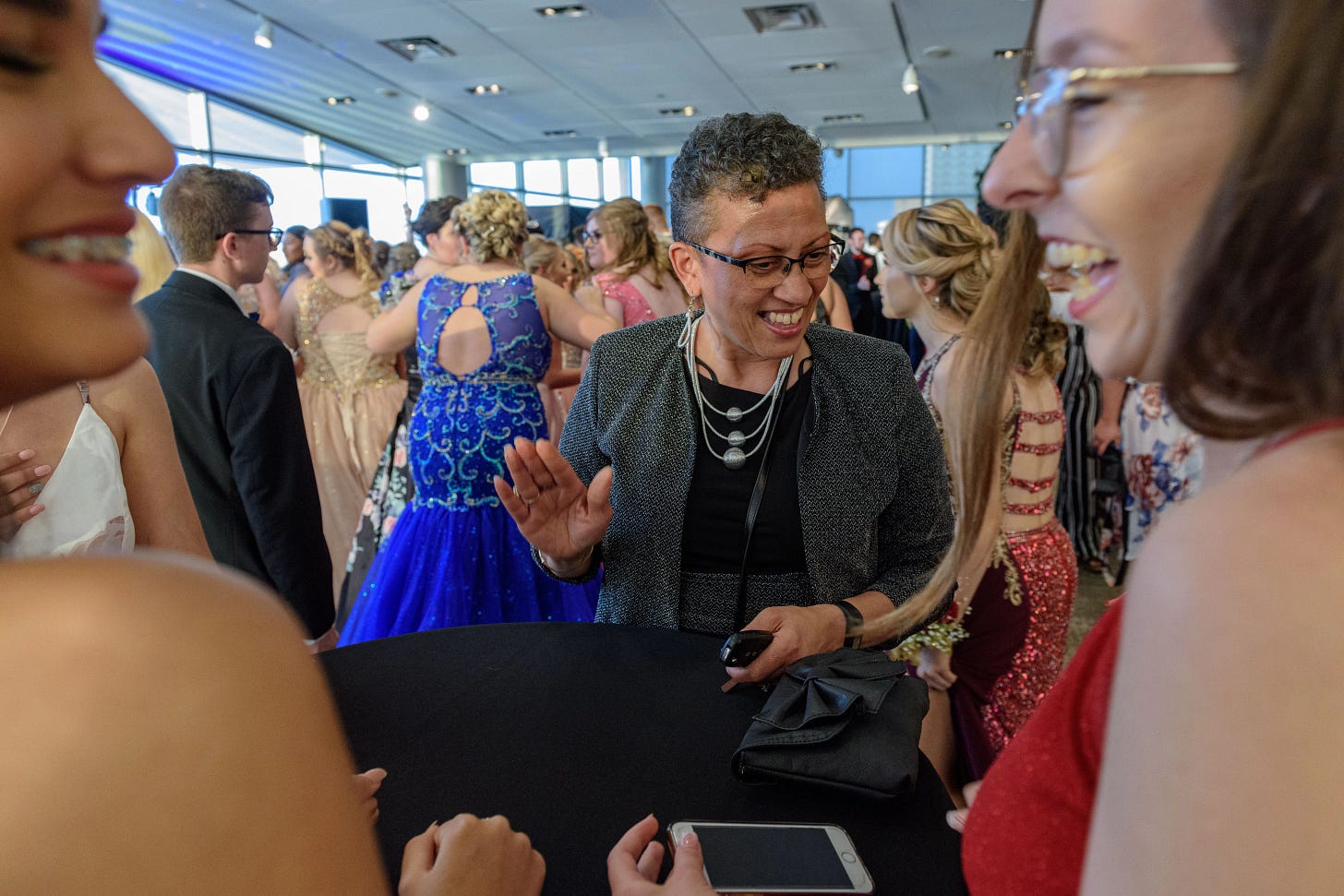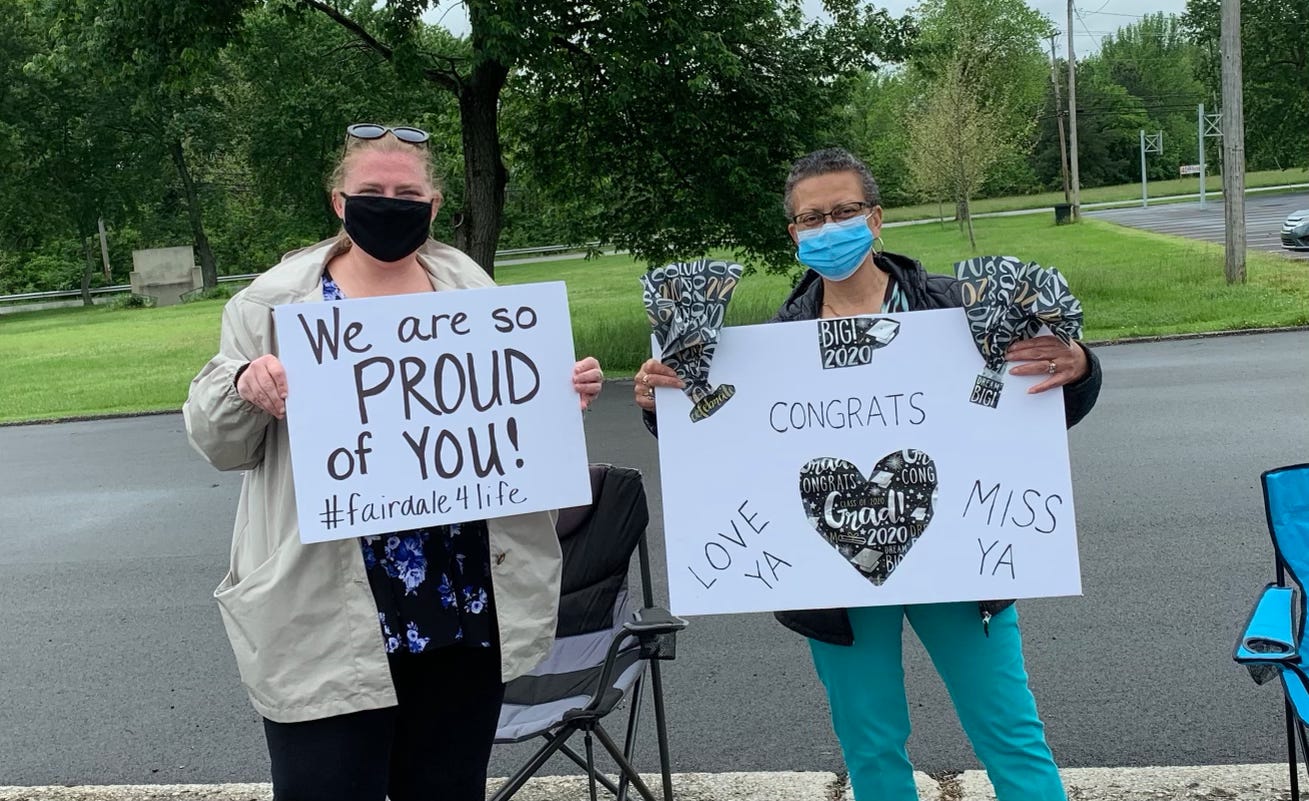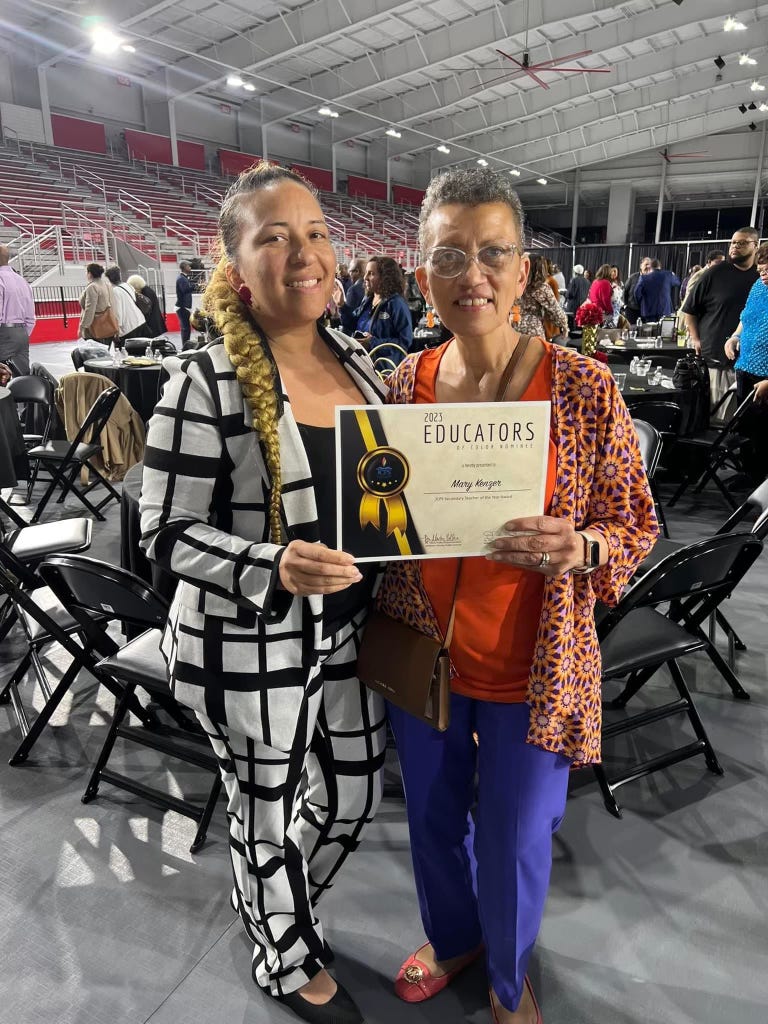Teaching Across Generations: Cultivating a Calling
A portrait of Mary Kenzer and her experience as an educator.
In 2015, my aunt, Mary Kenzer was chosen to be a keynote speaker at Elevating & Celebrating Effective Teaching and Teachers organized by the Gates Foundation. In this address she spoke about what her calling to become a high school English teacher and her teaching philosophy.
The first thing she seeks to impart upon her students is an understanding of the power of words. The very first week of school for homework, she makes them log every activity that they do in their daily life that pertains to literacy. Whatever it is from texting, to homework to reading a McDonald’s menus, they have to log it. They have to interview at least four adults that are employed to find out how literacy impacts their jobs. They also have to research facts and statistics regarding literacy. Something that always sticks out to them is the relationship between literacy rates and the rates of incarceration and also how one out of five graduating high school students can’t even read what is written on their diploma.
She does all of this so they can understand how what they are learning in her classroom will affect them in the real world. That is one of the biggest questions students always have when learning something abstract to them as mathematics or chemistry and them understanding how they can apply their knowledge is one of the first steps for them to be able to fully buy in to the commitment of learning.
Mary believes that getting your students to buy in is one of the most important aspects of creating a good learning environment. The students also need to understand that you as the teacher are a normal and flawed human being just as they are, and should not be seen as an authority figure to be placed on a pedestal.
Mary’s road to teaching was a long and winding one that isn’t as inevitable as one would believe from knowing her. Initially in her undergraduate years, she aspired to be a medical technologist. In her junior year, there were a limited amount of spots available in the program. In order to apply, an interview before the entire medical board was required. After a colleague of hers was rejected following her interview, she developed cold feet and decided to major in biology instead, an easier route given the amount of biology courses she had already taken up to that point.
As most students encounter when choosing a path, people around them tend to inquire about the future employment prospects of that path. “What do you do with a biology degree?” A question that came up frequently was whether she wanted to teach after she graduated. At the moment her answer was a resounding “No!”.
Years down the road though, that answer would begin to change. As Mary worked as a supervisor at Kroger, many of the people she supervised at the time were high school students. She wouldn’t know it then but years down the line, she would come to learn the impact all her care and dedication she put into training and mentoring would have on these young people. It was then that she realized that she was missing her calling, teaching. Mary realized the kind of impact she had if she fully dedicated herself to that vocation. She would return to school in 2001 to get her master’s degree in order to do so.
In line with her philosophy of getting students to buy in, Mary emphasizes developing relationships with your students, as one of the keys to her classroom management. If you know and understand your students, it will lead to an atmosphere of mutual respect.
When approaching “troubled children”, developing relationships and knowing your students becomes especially important. There is almost always a root problem to bad behavior in the classroom. Being able to talk to students and find these root problems is the key to addressing them.
Mary also invests a lot of time and money into her classroom. Being an English teacher, books are one of her main investments. One year she said she spent around $300 on books for her students to read. The principal supplies books for her class every year but sometimes students become so invested in their reading that they will take books and not return them, so this is a supply that is always in need of replenishing.
Aside from books, she always keeps snacks on hand for various occasions, such as student birthdays. But this also has an important secondary effect. Students that unfortunately go hungry throughout the day know that she has snacks available. If they come to her, they will have something to eat.
Other investments include prom tickets and library fees for students that cannot afford them. Library fees are particularly pressing for students, as if they go unpaid, the student will not be able to graduate. It’s unfair for students to be denied the fruits of their hard work over their high school years simply because they cannot afford the fees they have accrued at the library for whatever reason.
Mary is a fixture at the high school sporting events. She tries to support her students that play on the basketball and football teams, but it’s the high school track meets where you’ll find her most often, usually with Gatorade and water in hand for her school’s team. Track and field is an often neglected sport as many people do not find it as glamorous or important as a sport like football, so she makes it a point to show up to these events to support. This support also extends to the soccer team.
Cooking for her students is another way she shows her appreciation. For senior’s night she brought chicken for all the students and parents. She also cooks for the dance team. As we were speaking to her, she was in the middle of preparing food for the custodian staff showing her appreciation for them!
When you invest this much of yourself into your students, teaching can be a fulfilling vocation. There’s nothing like seeing the fruits of your labor at the end of a year being able to visibly see how much your students have learned and grown as human beings. Just as they learn from her, Mary also learns from her students as well. Teaching always exposes you to different perspectives and points of view that often broaden your own horizons. As Mary tells her students, she is their teacher because she has had many more years of life experience, but that does not mean that she is any smarter or brighter than any of them. There’s always room to learn.
Unfortunately one cannot always reach or get through to every one. Because of how much she cares for and invests in her students, it’s especially difficult for Mary when there are students that don’t care or put in effort. She has had some truly gifted students fail her class simply due to a lack of effort and interest. This is one of the downsides of being a caring and engaged teacher.
Students today face a lot of difficulties in the education and sometimes their shortcomings extend beyond effort. Reading difficulties is unfortunately a more common issue than one would imagine for some high school students. This is an issue that Mary believes begins very early on in their education in elementary school. If the student does not have a dedicated teacher early on that recognizes the difficulties they are experiencing and takes it upon themselves to deal with it, these issue often go unaddressed. The resources available to teachers has also been dwindling. Teaching assistants have become a rarity and class sizes have grown making it difficult for a teacher to even recognize specific issues in individual children.
If a student is having difficulty with doing their work, and they are not receiving the proper help, they will often become disruptive. This leads to them being slapped with the “behavioral problem” label. It will happen that an issue that has its root in difficulty learning the material will be met with disciplinary measures instead. These labels can follow a student their entire academic life and further exacerbates the problem. By the time they get to Mary’s classroom, the learning issue has turned into a source of frustration and shame for the student and the “behavioral problem” label has become the primary lens through which these students are seen.
Students also face difficulties in preparedness for high school because of the years of the COVID-19 pandemic. Online learning at ages where in-person learning is a necessity has affected students. Socialization with other students in person has been affected by this. Students also face issues of overstimulation from smart phones and social media. Distraction from social media affects their ability to engage in the classroom.
One thing that Mary believes can go a long way with addressing classroom difficulties is reducing the class sizes It impacts the degree to which teachers can engage with their students and it limits the effectiveness of the attention they are able to give. Because of the amount of students, not every student’s needs can be addressed and this can be perpetuated onward from grade to grade until it snowballs into a severe issue such as illiteracy in high school.
Parental involvement and engagement with their child’s education is also another factor that could contribute to a better educational experience for children. Something as simple as parents knowing what subjects their children are struggling in, or what assignments they have and whether they have completed them or not can go a long way. Just as the negative things can snowball into something serious, these little positive reinforcements can also do the same. Mary definitely appreciates the parents that are proactive with their kids in school, and she keeps up with them and always show their appreciation for them.
With two decades of service in her vocation as a teacher, Mary Kenzer has followed her calling and has continued to make an impact on countless youth that have gone through her classroom, encountered her a school events or simply have had the pleasure of being the recipient of one of her famous home cooked meals. Even though retirement is starting to loom, she doesn’t think about that yet. Her kids help her stay current and stay sharp and she doesn’t know what she would do without them!





Education, Economic and Excellence - all keys to the current and future success of our community. Thank you for writing this piece.